Mason Williams is unequivocally one of the brightest minds I know. The fastest mastermind athlete with the keenest focus. He’s a 5th Degree black belt, a nationally ranked Taekwondo champion, a martial arts instructor at LA’s #1 studio, a tech exec at a top Fortune 500 toy manufacturing company where he leads the Digital Production team (and does cool, techy, cutting edge things), a fellow BEAR, a teacher of mine, a supportive peer — and I’m lucky to say, friend.
When conversing with Master Mason Williams, I want to sit there taking notes absorbing everything he just said and reading into the stuff that he hasn’t — whether we’re exchanging words on our academic hero, Dr. Harry Edwards, our martial arts intellect, Grandmaster Chong or our personal lives. And of course when he discourses on techniques concerning efficiency and speed in Taekwondo. I want an external hard drive so I can download his brain, as I’ve told him before.
Mason Williams is THE prime example on how to live life.
He lives with immeasurable intention and gratitude – always moving forward with grace, motivation and resilience despite severe debilitating mental and physical setbacks (6 surgeries), time deficiencies in his iCal (see above) — and the multitude of adversities anyone is bound to encounter in life. He keeps on truckin’ and does so with excellence.
But, HOW is the question. And that’s why I asked for this interview — so I could stick my own feet in his footprints, follow his blueprint — and provide these superhuman life hacks to my readers as well. How does he accomplish so much and excel to the limits? He doesn’t just dabble. He masters. With the sharpest focus. And he does so in all of the spheres of his life.
Taekwondo has been his roots and physical and mental foundation since he was 5 years old.
He’s a superhuman in human form — so let’s hear how he got there.
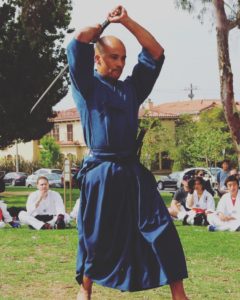
When and where did you start studying Taekwondo? Can you tell me a little about your achievements on the mat?
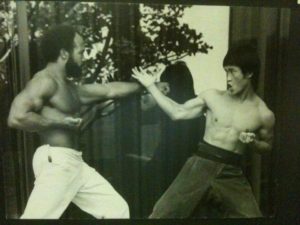
What does taekwondo mean to you figuratively/symbolically/literally?
The martial arts, Taekwondo/Hapkido specifically, is the root of who I am. I literally wouldn’t know who I am without it. I’ve studied for 36 years, never taking time to put it aside. And I have no memories prior to starting at 5 years old. It permeates every other aspect of my life from interpersonal relationships to my professional career and my approach and values as a whole.
[adsenseyu1]
You’re a master on the mat — but always a student of personal development. What have been your top 3 values that have pushed you to always upgrade yourself? Any stories in your career, relationships, athleticism, etc. are all welcome.
1. Discipline.
First and foremost the martial arts forged a discipline, and more importantly a passion for discipline. I’ve always enjoyed working hard and the process of working hard. The notion of the “ends justifying the means” never resonated with me. The idea of each “mean” being an “end” in itself fascinates me. This resulted in a thirst for pushing myself to find my limits and go beyond them in school, in training, and later in my career. This definitively influenced my approach to my pursuits.
When I was competing nationally, the number 1 guy (my chief competition) lived in Oklahoma, whereas I lived 2 time zones away in Berkeley. In my mind, I believed he was practicing at 6:00 am, even though I had no clue what he was doing. As a result, I woke up and practiced at 4:00 am. I made sure I was up and practicing when he was. Upon further review, this seems like the behavior of a slightly maniacal mind. But it was the practical application of the discipline I knew, believed in, and had success with previously.
Asceticism
The notion of asceticism intrigued, and still intrigues me, so I adopted odd practices like hitting bricks to strengthen my knuckles, fasting while training more in order to test my internal fortitude (hunger is a strong motivator), having my coaches hit me with various random items to focus my mind and release myself — and running barefoot and peeing on my feet to toughen my skin.
I tried not to talk about the peeing thing because I did want to seem somewhat normal and psychologically well-adjusted. For the record, I learned the technique from reading Jack Dempsey’s, the 1920s era boxer, autobiography. These physical applications and approaches were not hard for me to translate into mental approaches and preparations in other realms because I had proof of what they could result from them. It fed directly to my attraction of being prepared, whether it was for a job interview, a conversation, trying something new, etc. It takes a lot of effort to appear effortless in any endeavor.
2. Confidence and Faith.
Secondly, confidence and faith are key components to success of any martial artist on the mat or in the ring. The development of this confidence begins when the student walks into the studio and takes class for the first time. Each successive milestone reinforces the process of developing internal faith in oneself. Similarly, adversity on the mat is a mitigating factor keeping the martial artist from becoming overconfident. For example, when sparring/fighting, moments of overconfidence can lead to the opponent taking advantage and gaining the upper hand. The same occurs off the mat as well in our daily lives.
Balance is the core of the martial arts. Being overconfident or lacking confidence limit one’s ability to be successful. The goal is to be balanced and have realistic faith and confidence to face situations and know that we can emerge in the manner we envision we could. In my personal experience, I’ve relied on this confidence to expand my life on and off the mat. As a young martial artist from youth through my late teens I relied on the faith aspect. More specifically, long-term faith. I was never the most talented among my peers. I was the smallest and at that point in my artistic development, I could be physically overpowered by most of my classmates.
Physical Practice
Quite frankly, for my first decade of study I was mostly afraid of what could happen when they, or some adult, hit me — and in those days, we fought much harder and were much more physical than the way I teach my students. Malice and intent to hurt were never in the equation, but we were raised in a more physically challenging environment. To counteract the fear that permeated my motivation, I focused on being the student with the best defense, the best footwork, and the hardest to track down and hit. As it became increasingly apparent to me that those skills were taking hold, I began to develop what we refer to as “true confidence” in the studio. Then, I changed my focus and decided that I would craft my ability to hit others with greater frequency and greater strength.
That process really changed the game for me on the mat and it was the moment I began to separate from the pack and ascend to the next level of my path. Most importantly, it gave me a reference point to reflect on when I needed to utilize that long-term faith as a roadmap to developing and maintaining confidence in daily life.
3. Resilience.
Resilience is the third quality. I’d caveat that statement by acknowledging that the martial arts offers many beautiful competencies and I’d like to think I’m learning and absorbing as many as possible. I say resilience for a few reasons. Over the course of 36 years of training, I’ve had 6 major surgeries. In college, I tore my ACL — and a year after the injury, I was once again one of the top fighters in the nation. I tore my rotator cuff and built myself back up. I was in a near-fatal car accident, broke my right femur in half. Had a 22 inch rod inserted into my leg, relearned how to walk, and was teaching Taekwondo within four months. Most recently, I had my left hip replaced in 2015 and I feel better than I have in almost a decade.
These moments are humbling and each one forced me to look inside for healing both physically and mentally, but each time I emerged a better person and my physical skills actually improved. More importantly, it has helped to shape a larger philosophy that I adhere to. The core of that philosophy is the idea of “never going back”. When folks have asked me, “Mason, when are you going to be back to where you were before your injury” I’ve tended to react very strongly and it brings out the fighting spirit that is intense. I realized that is because I don’t believe that I’ll go back or get back, I can only go forward. Focusing on getting back to somewhere is retreating and regressing. I want to progress and evolve. This is revitalizing and invigorating.
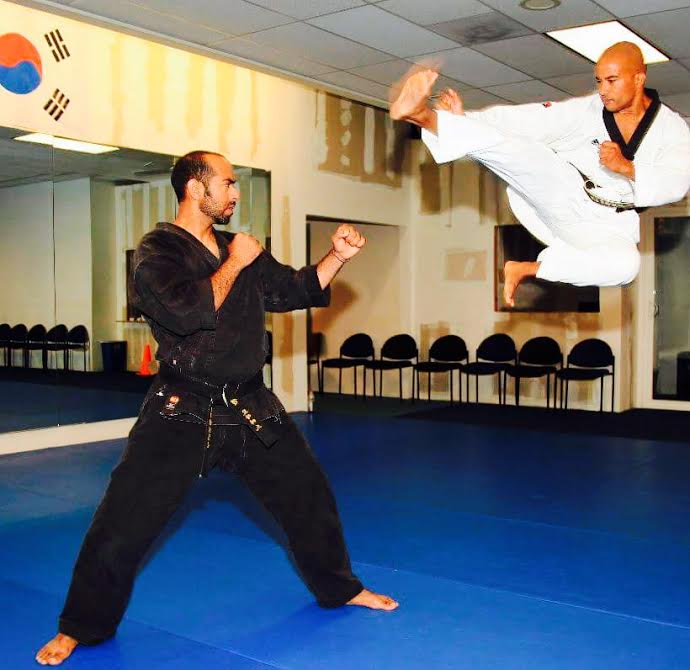
What has proven to be more valuable in your life? Success or failure?
I’d like to use the terms success and adversity if that’s cool with you. With that said, adversity has been much more of an inspirational friend to me. That’s not to say success isn’t influential and valuable. It is, and it’s good to feel successful. Having something to work toward while simultaneously working through challenges feels fulfilling. It is in those moments that the greatest successes emerge.
Over the years of being an instructor, I’ve encountered a myriad of personality types. I have noticed that the students who have everything come naturally and taste success at every moment are the ones who drop out when they get a black belt. Or, they lose interest when the first true challenges to their streak of successes present themselves. Conversely, the students who persevere through difficulties develop an appreciation of the path that led to the success and then doesn’t see success and adversity/failure as diametric opposites. They, in turn, are open to challenges and the growth paths that those challenges illuminate.
Adversity as Motivator
Personally, I gravitated to adversity as a motivator out of a need to have my feelings of the challenges of growth validated. Sometimes, speaking about success and celebratory achievements has made me very uncomfortable, reclusive even. I enjoy accomplishments, but inevitably a slight depression appears as I search for the next thing to learn and incorporate. There are times, fewer now than in the past, where this brooding nature has directly resulted in sea changing moments such as thinking of a new modality for teaching techniques and the arts, creating a new game/play pattern/toy idea, or opening my mind to a new perspective on something either filled with gravitas or trivial.
When I was young, I went through regular periods of brooding and intensely introverted (while still appearing extroverted because that’s how I hid in plain sight). What brought me out was finding something new to explore and create, get good at, and share. This led me to look for new means of expression and broadened my horizons. As these dour periods worsened and became more frequent, I was diagnosed as being Bipolar 2 — and at the time the stigma of “mental disease” was something I wanted to hide. Sometimes referred to as “Rapid Cycling Bipolar” episodes, Bipolar 2 occur with greater frequency, but shorter durations, than the more extended periods of depression or mania that Bipolar 1 folks have on a less frequent basis.
Beautiful growth periods have come during these episodes and I can now affectionately refer to them as my regular “Mental Menstruation” and my “gifts.” They are a fact of who I am and I’m still learning and loving the influence shape my relationship with my martial arts.
[adsenseyu1]
Are you a conformist or a misfit? How has that helped or held you back?
I’d consider myself more on the misfit end of the spectrum, but I reckon all of us have some elements of both. More than being a misfit, I would consider myself one who hasn’t always fit it in the circles I’ve been party to. There were only a couple other Black kids in my martial arts classes, and as the years went on that number dwindled. I didn’t speak about martial arts outside of the studio because there were times I was made fun of or challenged to fights. Being called “Bruce Leroy”…one of the most clever and greatest epithets ever…was always on my mind in some form.
In school, I was always either one of a few or one of one Black kids in my classes, even through my time at UC Berkeley. Fear of being looked at as the token or not being Black enough were thoughts that I contemplated with seriousness. Today, as a Black man in the tech industry I still don’t see many faces that look like mine and that is saddening on a societal level, but on a personal level that reinforces the “you don’t look like fit in” for those of us who are in the industry.
Space for All Misfits
Moreover, there is space for all misfits to fit in conformity just as there is space in the domain of misfits for conformists. Similarly, in the martial arts, my peers are 60-70 year old Asian guys. So it’s pretty easy to see the differences when we all sit down at the “Masters’ Table” at tournaments or when we go to dinner. I cherish it though because it’s a reminder that the paths we take aren’t necessarily what would be considered expected. That’s a lesson I enjoy sharing with kids and adults. If our path is genuine, the labels eventually fade and we just are who we are. Let others determine for themselves what they think we are.
With all that said, I do feel that many of my values are highly conformist. I’m a staunch subscriber to the martial arts precepts of success through discipline, commitment, passion, and persistence. These are values that are traditional and I’m proud to represent them and strive for them.
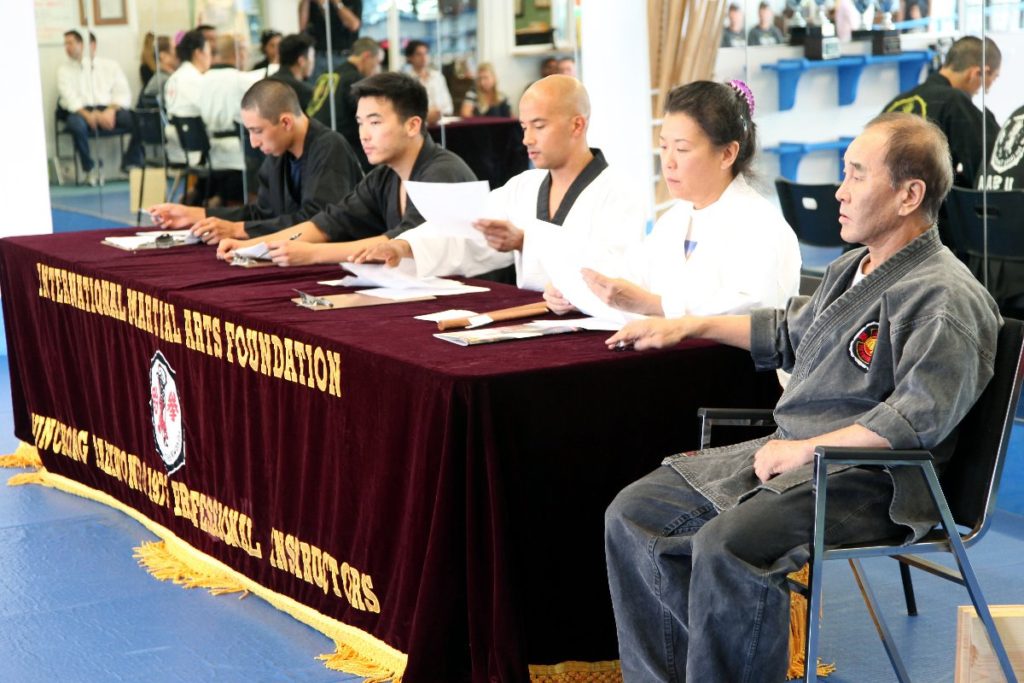
You’re in a position of leadership daily — so you have accountability to the people you surround yourself with. Is this an honor, a conscientious effort, a stress?
It’s an honor, an effort, and something I eagerly seek out. My grandfather taught me and trained me to think of the idea of being extraordinary is what I should consider ordinary. There was a heavy personal and socio-historical reason he said this because of his experiences with segregation, being looked over for positions despite being a Ph.D. while being a bus driver, and the fact he felt I could overcome any obstacle by striving for the extraordinary. Merely being a part of something has never been enough. The notion of affecting those around me has always motivated me. I believe that we all can affect one another. That’s the beauty of human interaction. We can leave marks on each other, for better or for worse. Those who consciously seek to touch other’s lives can simultaneously fill their life with deeper meaning.
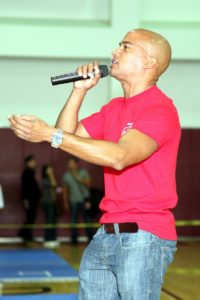
I come from a family of teachers, and I began teaching martial arts at 15 years old. I remember feeling so happy standing in front of a group of kids and adults and sharing what had been passed to me and actually have them enjoy and accept what I was saying. It was empowering, humbling, inspiring, and affirming all at once.
Those feelings are still there with the same intensity. The added depth of refining and honing the skills over years is such a blessing. It’s also given me the freedom and openness to engage in random conversations with anyone anywhere and be open to them affecting me and learning from them, just as I would hope to leave them with something.
Martial Arts Instructions is a Dialogue
One of the keys of being a martial arts instructor is the ability to realize that the instruction is a dialogue, not a monologue. I’ve prided myself on leading by example, not teaching from a podium so to speak. Kids and adults see me doing the same physical work they do and they see the joy I have doing it. I never felt, and still don’t, that I was a superior martial artist to any of my students. I may have more experience and more developed skills, but that’s not the point of the art. The art is designed for all of us to maximize ourselves.
My job is to show how I try to maximize myself so that others can see steps for them to do the same. At the same time, I am learning from them and gleaning elements of their philosophies and approaches. That is the nature of the dialogue…the constant evolution.
Philosophical Training
When I mention seeking out the opportunity, that is something that came from the philosophical training my Master and other masters I’ve learned from taught me. The notion that I could affect people and situations meant that there was a responsibility to intervene, insert, and assert myself when others ignored or shied away from. It’s what drove me to want to be a conduit for the martial arts and eventually what some call “a master” at my craft. It’s a borderline superhero complex because we can’t always influence or change an interpersonal outcome or situational outcome no matter how forthright our intention and our effort is.
Case in point, I was playing basketball a few years back and a complete stranger collapsed on the court. While everyone else ran to grab cell phones to call for help, I ran to grab the guy and help him. I held him for a few minutes and he died looking right into my eyes, face to face. I did what I was trained to do, help, and despite my efforts, there was nothing my intentions could do. It took quite some time to come to completely accept that fact, but it’s not much different than being open to teaching anyone. All we can do is offer ourselves. The rest is out of our control.
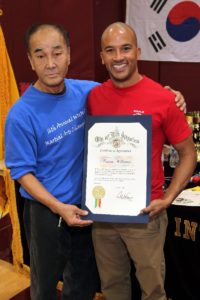
Becoming a Leader
There is an element of obligation that I have felt in varying degrees over the years in regards to my position in my master’s, Grandmaster Jun Chong, studio and the martial arts. At a young age, I unofficially tapped to be a leader for my generation of the school. It was something I wanted and something I set out to become. But there have been times when the responsibility became daunting and slightly overwhelming.
Grandmaster Chong means the world to me. And being his lead instructor for 20 years is something I take tremendous pride in. He has taught me and offered me insight as to how he evolved over the years and where he was at my age. In addition, he’s shared deeper martial arts philosophies with me, things that he doesn’t share with others. My job when I receive these lessons is to contemplate them and grow.
Over the years, I’ve always sought the person that I could prepare in a similar way. That person would need to come from a similar path that Grandmaster and I do. It is rare to find a young student who commits to studying for more than 15-20 years. And is eventually prepared both physically and mentally to embark on the deeper journey.
At times, I’ve sensed folks who have potential, but most stop studying or their interest wanes. I completely understand the life situations that can lead to one shifting gears. However, I sometimes feel a pressure and self-imposed heaviness when thinking of how to keep the more esoteric elements of the traditional martial arts alive in the community as he and I both age. These are the things that at times keep me up at night, but they also inspire me to continue on the path.
How do you practice intention and motivation in your daily life? You’re welcome to share any sort of morning/nightly ritual.
I practice Taekwondo daily in some form or fashion. It’s more important than ever now. I usually wake up around 4:00am and then get some time to train. It’s the way for me to erase myself and become a blank slate for the day. One thing I like to tell myself is that I really know nothing. That way I can go out and learn everyday.
It’s really helped me professionally because I’m by no means the most learned person in the room of people I work with. Saying “I don’t know” or “Can you teach me this?” are very difficult when we are mired by our own assumptions of what we know. Folks tend to open up and help when approached by someone who legitimately wants to learn from them. It’s a mutually beneficial experience because the person asking the question gets immediate gratification. The person being asked can feel the sense of value and influence that we all need, but sometimes don’t know how to find.
I’m an intensely competitive person.
I don’t feel the need to compete against other people in as much as I am compelled to compete with my boundaries, my comforts, and limits. If I can see it and understand it, I want to be able to do it and do it well.
The more techniques, both figuratively and literally, we have and we develop, the better equipped we are for various situations. I’d like to think that I’m stacking techniques in all forms. Whether it’s the ridiculous amount of time I’ve spent learning random facts just to be able to win Jeopardy alone on my couch, the hours and years of practice that led to being a nationally ranked fighter, the time spent reciting funny lines and analogies in my mind just to make a random point when teaching class, or the time spent looking at my weaknesses and moving from lamentation to acceptance, I simply enjoy the process or stacking the techniques.
What autobiographies have made a huge impact on you? Which musicians fuel you?
Without a doubt, the number one influence on me is Miles Davis. His autobiography is a wonderful read. Miles is truly my hero for several reasons. Miles truly personified the idea of constant evolution. His music evolved over the years from style to style and he never stopped seeking out what was next. His rise to fame under the tutelage of Dizzy Gillespie and Charlie Parker was his finishing school phase. Miles’ “Kind of Blue” ballad jazz years produced some of the most recognizable and commercially successful jazz of all-time. Then he turned away from that era and kept moving forward looking to learn from and influence younger genius-level players like Coltrane, Wayne Shorter, and Herbie Hancock. In the late 1960s traditional folks said jazz shouldn’t be electrified, but Miles scoffed at that and he created the best-selling jazz album of all-time, “Bitches Brew.”
People asked him why he never played any old songs at concerts. His answer was simple, “I’ve already played them.” That embodies the idea of never going back. All the while, Miles unapologetically promoted Black culture and spoke on behalf of our people in the times he did speak. He was an intellect, an artist, a classically flawed person, and a lifelong student. I’d love to eventually be all of those.
How intricately connected is physical and mental fitness — and how do you optimize both?
The physical and the mental are one in the same. Harmony between the two can unlock a person’s higher self and greatest potential. The benefits of physical fitness are well documented and one doesn’t need to be a doctor to understand that. I consider mental fitness to be the physical training of the brain. Reading, writing, conversing, painting, drawing, playing music, etc. — these are all physical means of training the brain as a muscle just like running trains the legs and the heart. Those activities prepare us for the next level of mental fitness. I would argue that mental fitness means bridging the gap between the brain, an organ, and the mind, the essence that exists in the brain. Mental fitness is the application of a well-trained brain. The fit brain unlocks access to the mind.
Applying one’s mind in conjunction with a honed physical body can then unlock the core of our higher selves. Let’s call that the spirit, or in martial arts terms, the indomitable martial spirit. When all three are present and harmonious we are what James Brown and George Clinton referred to as “being on the one”. The one is that first beat of every measure where everything hits at the same time. It’s the thing that makes our heads bob in unison. I wholeheartedly believe that when all three elements are present we have the power to heal ourselves, be connected with others, and gain greater insight into the world around us that is both seen and unseen.
[adsenseyu1]
Now, how does one get these three elements working?
First, learning one’s body and pushing it, transforming it, and mastering it must be done. This takes years, but the path can be embarked upon at any moment when the person is ready. Do we need to be a world-class athlete to be physically fit? No. A person maximizes their unique capabilities. I once taught an amazing man who survived cancer and decided to start learning Taekwondo at the age of 70. He eventually earned his black belt and he took full advantage of his physical capabilities. I learned so much from him and seeing the fruits of his labor gave me faith that I too will one day maximize my abilities.
Applying the mind to the physical endeavor is the next step. This is easier to do when the physical activity has a philosophy behind it. This differentiates martial arts from other activities, not that this can’t be achieved in other sports. Most sports either do not have or do not openly communicate their underlying philosophies to the beginner student. So that makes the connection a little harder to conceptualize. Lastly, the practitioner begins to feel a connection internally and that is the space where the harmony is.
Breaking Down the Four Fs
I explain to students that learning can be broken down into “Four Fs.” The “Fs” are form, function, feeling, and freedom. Form is learning how to do something. Here’s how to hold your hand for a fist. Here’s how to throw a basic kick. Function is learning why we do something. Why do I hold my fist like this? When do I throw this kick? These first two “Fs” can take years to understand and master. Feeling is the combination of form and function. We know how and why we do something and now we don’t think of them. Instead, we feel when we are doing it right. Lastly, comes freedom. That is a state where a person becomes the technique. It’s quietude. It’s what the Samurai referred to as “no-mindedness.”
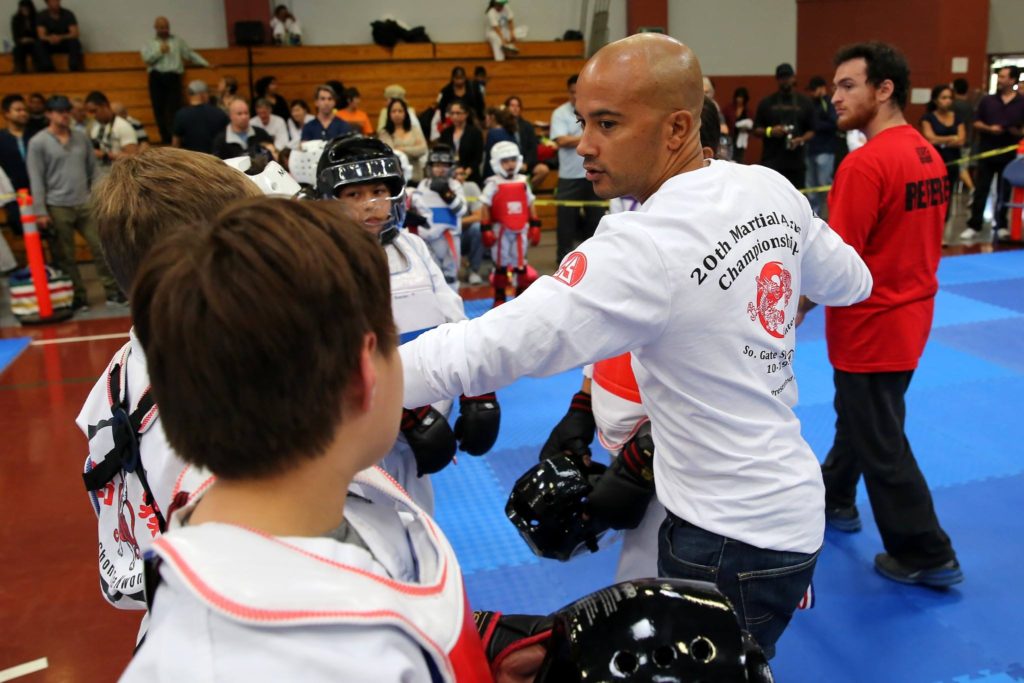
What’s the difference between a black belt and a white belt? What about a black belt and an nth degree black belt?
The quote that is often used is “a black belt is a white belt that never quits”. I like that as a basis of an answer. Never quitting is a noble endeavor, but I’d add the idea that a black belt is a white belt that keeps growing. That removes quitting from the equation, and it can account for things like aging. Will I kick the same when I’m 70? Probably not, but I won’t stop growing in this art.
The difference between a black belt and the higher levels goes back to the Four Fs I referred to earlier. I’d add that the ability to self-correct and the awareness to know what is right and wrong with their techniques, and thus their approach, is a significant differentiator. Moreover, I think the ability to teach others is supremely important as black belts mature. I’ve probably taught more than 2000 people in my 25 years of teaching. And only about 15 have ever become instructors on any level. I don’t mean they opened a school or they became full-time martial artists. Teaching martial arts is not my full-time vocation, but it’s been my full-time avocation for as long as I can remember. I think sharing what we learn separates the higher-level black belts from the black belts.
What is your end goal — in life and in practice?
I’m not sure what my end goal is to be honest. My best answer is it remains fluid. I’d like to be a good person, husband, father, brother, son, and someone who shared himself with anyone who was willing to engage. As a martial artist I’d like to be thought of as being well rounded, a personification of the precepts we teach, and a direct descendant of the pure line of martial arts that Grandmaster Chong has inducted me into.
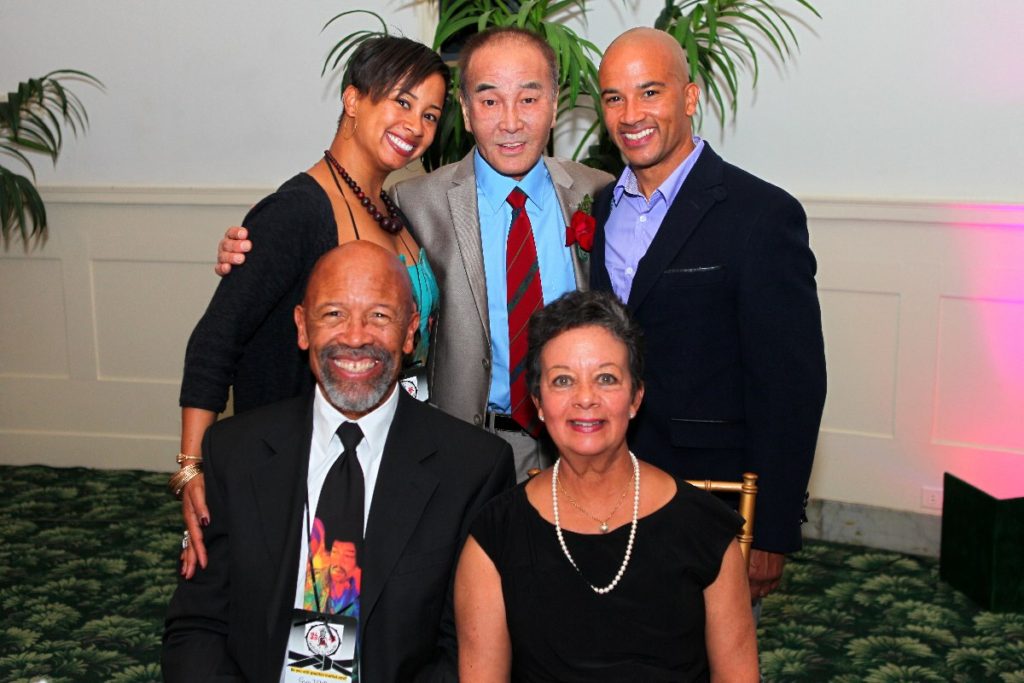
People are chasing happy in externals (the dangling carrots). What are your intrinsic vs. extrinsic motivators? How do you find true self-reliance and resilience?
I’m mostly motivated from within. I have some vision of the person I think I could be and who I am, and I want to be that. One of my favorite athletes of all-time is Rickey Henderson, Major League Baseball’s all-time steals king and overall eccentric guy. Rickey had a penchant for speaking of himself in the third person. It’s something that I’ve done for a long time. I used say things like, “it does not matter, eventually Mason Williams is gonna fight everyone” when asked about my preparation for a tournament. More recently, I say things in reference to this “Mason Williams” guy in my head. My friends and family laugh at me like the fool I am when I do this, and partly it’s for comedic effect. But in reality, I want to be Mason Williams.
Externally, I’m driven by the desire to make the best for my family and friends. Also, I’m inspired by the idea of sharing my story/stories with folks and having them say “I’ve never heard something like that” or “wow, that’s a cool story.” Selfishly, I like standing out in the attempt to be outstanding.
[adsenseyu1]
How do you change your perception in what is possible for you?
I think the ability to be flexible and open to change is the gateway to changing perception in any sense. Let’s call it, “listening to the wind”. Years ago, I was working as a writer for a trivia game and the main producer left after throwing an epic temper-tantrum that included hurling a computer at a wall, a bizarre combination curse words strewn together, and a little bit of mouth-frothing. The CEO of the company came in and asked who could take over the producer’s work because we were in a bind. I studied the producer while I was there. Asked questions, and when the time came I said I could do the job. It came up, I was open, I finished the job. And the next thing I knew I was in a completely new career.
That 30 seconds of chaos changed my life forever and unlocked things I didn’t know existed for me. The bottom line is if we are open to change there are many things we may not see, but are there for us to discover.
Your martial arts movements are always a creative flow, there’s much more to it than physical prowess. What goes through your mind? What happens in the incubation period before a fight or performance? Does this parallel your practices before meetings at work, for example? Or before you walked down the aisle?
That’s a good one. My process is pretty simple. It’s been a long time since I was in a tournament, but when I fought I would become very quiet for a day before, almost in a brooding manner. The day of the fight I would empty everything. Although violence lies at the core of actual fighting, I never needed to be emotionally stirred. I envisioned myself as a tool with a job to do… a conduit so to speak. The last thing I do is kiap (the martial arts yell) from the pit of my soul and then go do the job. It’s funny because I do this at work, but I go to my car to kiap because yelling in the middle of a business place is a little outside of the accepted social norms. Even I can see that. And yes, I did the same thing when I got married…minus the no emotions part.
What is wrong with the Millennials today?
I honestly don’t think anything is wrong with millennials, they are products of their own era. They grew up in times that have more stimulus inputs than any other generation before them. The wide amount of television and movie content, the celebration of cult of personality over substance, the instant gratification that can come with media consumption, the social currency of “likes” and the effects that has on one’s psyche, and even the gig economy all contribute to their perspective. Sometimes I think the “entitlement” argument is overused when referring to them. A person can only assume that they are entitled to something if they are given the opportunity to feel that way. I reckon that’s a combination of parenting, society, and their own doing.
I will say that one thing I’ve had to try and comprehend is the lack of commitment that permeates the millennial generation’s ethos. As a guy who’s been doggedly, almost ascetically, committed to one pursuit for 95% of his life, I found it disturbing that so many young folks just bounce from one thing to the next, not mastering anything. That speaks to the differences in the environment they great up in. Gen X grew up with fewer media outlets and parents tended to not put their kids in a bunch of activities. We were exposed to less. Millennials came up in a different time.
“Greatest Generation”
Upon further review, there is space for all the generations to coexist and learn from each other. The “Greatest Generation” had similar thoughts about the Baby Boomers as they came of age in the mid-late 1960s. I’m sure the Baby Boomers thought we were pretentious and over-confident as we came of age. We are doing the same thing to Millennials. I guess the best we can do is share our perspective, be open to theirs, and then go buy some artisanal, gluten-free, organic, non-GMO, hand-crafted quinoa mittens and wax our handle-bar mustaches in solidarity.
And there you go. One of the best interviews and people ever. Am I right?
Thank you, Master Williams. For this and for so much more.
+++ All photos including featured photo by Jack Lue Photography.
+ AND STAY TUNED READERS: COMING UP ON THE BLOG ARE INTERVIEWS WITH THE CREATOR / SHOWRUNNER of MARVEL’S AGENTS of S.H.I.E.L.D., MAURISSA TANCHAROEN WHEDON, THE STUNNING ASHLEY BORDEN, CELEBRITY TRAINER TO RYAN GOSLING, REESE WITHERSPOON AND CHRISTINA AGUILERA — AS WELL AS AN INTERVIEW WITH THE INCREDIBLE + MULTI-TALENTED, SARA GILBERT, EMMY NOMINATED ACTRESS, AUTHOR, YALE GRAD, CO-HOST + EXECUTIVE PRODUCER OF THE TALK, MOTHER AND WIFE. It’s going to be good!

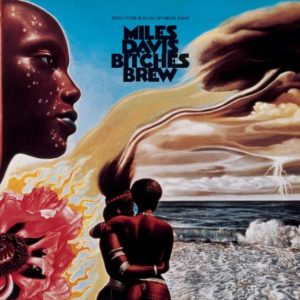
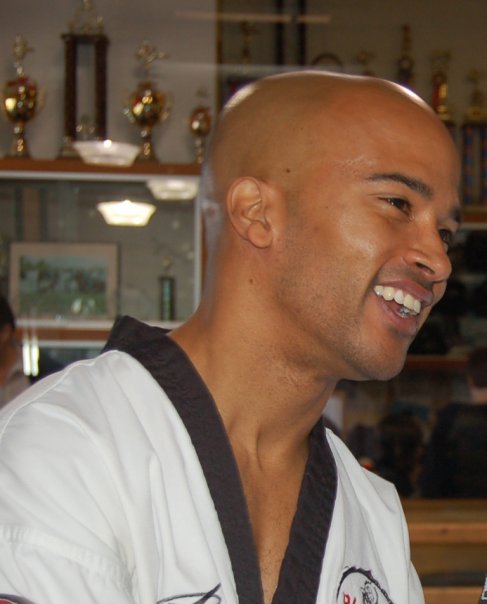

[…] a committed mom, practice taekwondo and write before I head off to work. (Writing, blogging and taekwondo are my other loves and obsessions.) Lifestyle (and not just financial reward) is the biggest […]
[…] INTO THE LABYRINTH MIXED REALITY COOPERATIVE VR BOARD GAME :: as suggested by MASTER MASON WILLIAMS (Fortune 500 toy tech exec, nationally ranked Taekwondo champion, 5th degree Taekwondo master, Cal […]
[…] amazing guests coming up very soon. Yankees’ Nick Swisher, DoBoy Jackson, Jeanette Jenkins, Master Mason Williams and Hudson Jeans founder, Peter Kim to name a few. Tune in and subscribe to KIMCHI AND […]
[…] years (2-3 hours a night, 5-7 days a week) after stepping into my first Taekwondo class — I earned my first black belt with my name emblazoned in Korean characters. I hurried […]